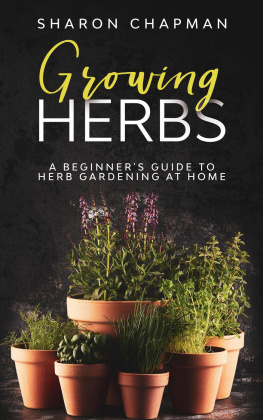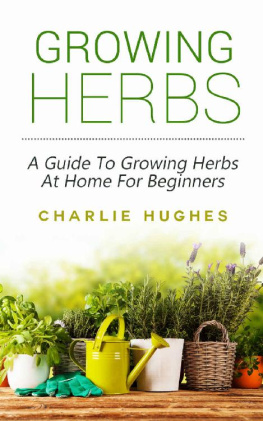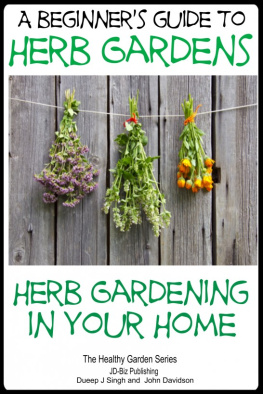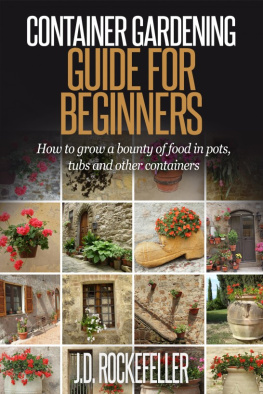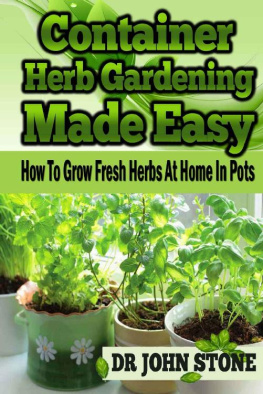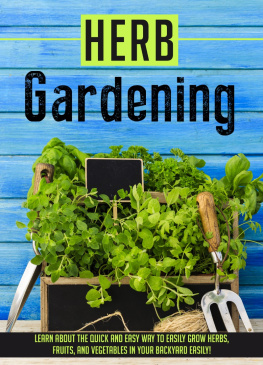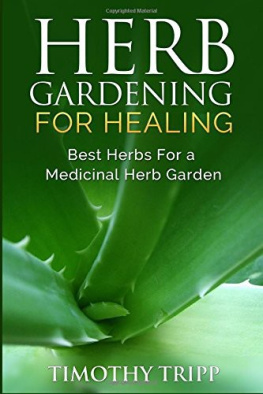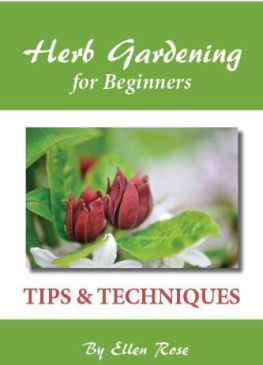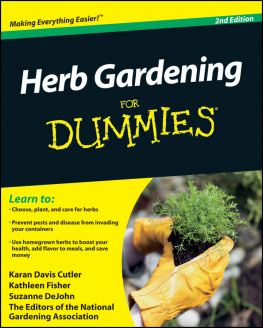Growing Herbs
A Beginner's Guide to Herb Gardening at Home
Copyright 2020 - All rights reserved.
The contents of this book may not be reproduced, duplicated or transmitted without direct written permission from the author.
Under no circumstances will any legal responsibility or blame be held against the publisher for any reparation, damages, or monetary loss due to the information herein, either directly or indirectly.
Legal Notice:
This book is copyright protected. This is only for personal use. You cannot amend, distribute, sell, use, quote or paraphrase any part or the content within this book without the consent of the author.
Disclaimer Notice:
Please note the information contained within this document is for educational and entertainment purposes only. Every attempt has been made to provide accurate, up to date and reliable complete information. No warranties of any kind are expressed or implied. Readers acknowledge that the author is not engaging in the rendering of legal, financial, medical or professional advice. The content of this book has been derived from various sources. Please consult a licensed professional before attempting any techniques outlined in this book.
By reading this document, the reader agrees that under no circumstances is the author responsible for any losses, direct or indirect, which are incurred as a result of the use of information contained within this document, including, but not limited to, errors, omissions, or inaccuracies.
Table of Contents
Introduction
Do you like gardening? Do you like the idea of growing herbs at home? Do you want to start an herb garden at home, but don't know where to start? If yes, "Growing Herbs: A Beginner's Guide to Herb Gardening at Home" is the perfect book for you.
You don't need a green thumb to start gardening. If you have never tried your hand at gardening, it can seem intimidating. However, as with anything else in life, a little planning and preparation are needed. The first step to start gardening is to learn more about it. Irrespective of whether it is the balcony, terrace, or even the windowsill, you can create your little corner of paradise with an herb garden. Tending the herbs, watching them grow, and finally harvesting them, there is a lot to look forward to.
Herbs are easy to grow and maintain. They also offer versatility and are the perfect fit for beginners. Herbs provide a variety of medicinal properties and can be used in cooking. When used in cooking, they can instantly elevate the flavor profile of any dish. If using fresh herbs appeals to you, start following the tips and steps given in this book.
In this book, you will learn about the benefits of growing herbs at home, steps to start an herb garden, different methods of growing herbs, and gardening ideas for small spaces. You will learn about the ten best herbs suited for a beginner's herb garden and some tips to get you started. Once you are armed with all this information, herb gardening will not seem intimidating. If you are excited and eager to learn more about all this, let's get started immediately.
Chapter One: Introduction to Herbs
I n the culinary world , the word herb is used to describe the leafy green part of a plant used to season or flavor a recipe, but it isn't used as the main ingredient. This definition isn't entirely right, because spinach is a green part of the plant, but it is not an herb and is a vegetable. Likewise, lettuce is also not an herb, but it is the green part of a plant. So, what is an herb? All plants that have aromatic and fragrant properties are known as herbs. Herbs are not only used to flavor foods but are also commonly used in natural medicines such as Ayurveda and even the cosmetic industry. Some common examples of herbs are rosemary, basil, parsley, dill, and thyme.
History of Herbs
H erbs are commonly used in cooking and help complement and enhance the flavor profile of different ingredients used. For instance, adding fresh basil to pasta or rosemary to potatoes changes the flavor profile of the entire dish. Fresh herbs have a stronger aroma than dried ones. The vitamin content and intensity of fresh herbs is quite stronger than the dried variants. Humans have been using herbs for over millennia now. It's not just culinary uses, but herbs even have medicinal applications. We have all been using herbs since ages to flavor and preserve food.
Herbs are commonly used in holistic healing systems such as Ayurveda, which dates backs to more than 5000 years. It relies on herbs and spices for their medicinal properties to heal the body and mind. Somewhere between 300 BC-200 A.D., a book about different medicinal plants was written in China, which was based on the knowledge passed on by Emperor Shen Nong. The book included information about more than 300 plants their medicinal uses and techniques for seed preservation. These plants were also classified based on their strength and toxicity.
The Ebbers Papyrus dates back to circa 1550 BC and is an Egyptian medical paper, including information about various herbs. It included more than 500 plant-based remedies for common medicinal problems. During the first century B.C. and 2nd century A.D., Hippocrates and Galen, famous Greek thinkers and doctors, came up with different herbal remedies as a form of treatment. Hippocrates, the father of modern science, believed in the healing properties of herbs. Colonists and settlers discovered several native herbs and plants used for medicinal purposes by the indigenous tribes. For instance, Echinacea is an herb native to North America and is commonly used to treat infections. It is still used for this purpose these days.
The healing power of herbs indeed withstood the test of time and unsurprisingly, the pharmaceutical drugs. We used these days, based on botanical ingredients are used to treat the same conditions which were identified by the business ages ago. So, it's not just your cooking that improves with herbs; you can also improve your health.
Benefits of Growing Herbs at Home
F resh Herbs
Perhaps the most significant benefit of growing herbs at home is that fresh herbs will always be available at your fingertips. You don't have to go to the grocery store or wait for fresh produce at the farmer's market. Now, you can grow herbs at home. You merely need to pluck a few leaves from the potted plants as required. Irrespective of whether you are growing them indoors or outdoors, you will always have the ingredients you need. Organically grown herbs taste better than once grown using chemicals and harsh fertilizers. They are also more nutritious than regular ones available on the markets. Whenever any harmful inorganic chemicals and fertilizers are used, the nutrients are absorbed by the plant, but they also absorb all the other harmful chemicals present. These chemicals slowly make their way into the food chain. Prevent all this by growing your own producer home.
Seasonal Adaptation
You no longer have to wait for the right weather to grow the herbs you want. You can stimulate natural light using artificial grow lights and maintain your indoor garden irrespective of the season. Most herbs are quite forgiving and can survive in harsh conditions. All you need to do is water and fertilize them with organic fertilizers, take care of their soil requirement, and provide sufficient light. Once these four things are taken care of, you can pretty much grow any herb you want.
Next page
